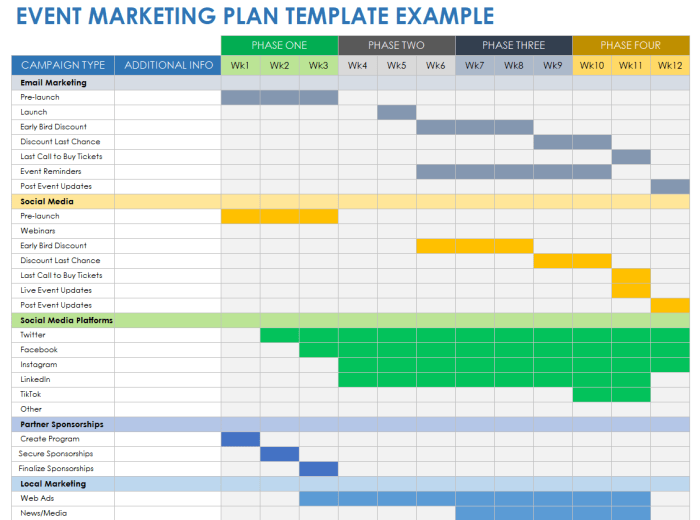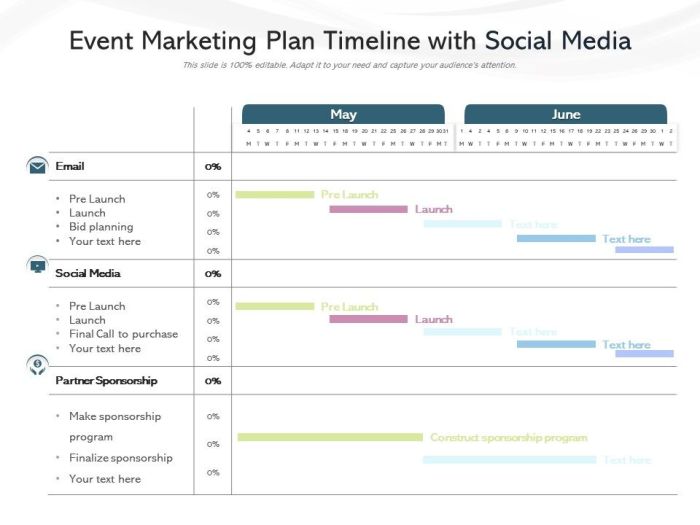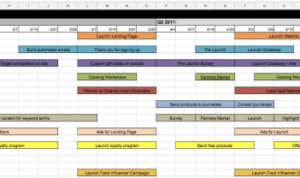Developing an Event Marketing Plan takes center stage, this opening passage beckons readers with american high school hip style into a world crafted with good knowledge, ensuring a reading experience that is both absorbing and distinctly original.
When it comes to organizing a successful event, having a well-thought-out marketing plan is key. This plan not only helps in setting clear goals and reaching the target audience but also plays a crucial role in promoting the event effectively. Let’s dive into the essentials of crafting an impactful event marketing strategy.
Importance of Event Marketing Plan: Developing An Event Marketing Plan

Having a well-developed event marketing plan is crucial for the success of an event as it helps in creating awareness, generating interest, and driving attendance. Without a solid marketing strategy, even the best events can go unnoticed.
Achieving Event Goals and Objectives
An effective marketing plan can help achieve event goals and objectives by reaching the target audience, creating buzz, and increasing engagement. By strategically promoting the event through various channels, organizers can enhance visibility and attract more attendees.
Examples of Successful Events
- The Coachella Music Festival: With a strong social media presence, influencer partnerships, and targeted advertising, Coachella has become one of the most popular music festivals in the world, selling out tickets every year.
- The Super Bowl: The Super Bowl is not just a football game but a cultural phenomenon. Its success is attributed to a well-planned marketing strategy that includes commercials, halftime shows, and promotional events leading up to the big game.
- The New York Fashion Week: By leveraging the power of fashion influencers, exclusive invites, and media coverage, New York Fashion Week has established itself as a premier event in the fashion industry, attracting top designers and celebrities.
Components of an Event Marketing Plan

Creating a successful event marketing plan involves several key components that are essential for the overall success of the event. These components help in outlining the strategy, goals, and tactics needed to promote the event effectively.
Setting Clear Goals, Developing an Event Marketing Plan
Setting clear and specific goals is crucial in any event marketing plan. These goals should be measurable and achievable, helping to guide the entire planning process. Whether the goal is to increase attendance, generate leads, or boost brand awareness, having clear objectives will ensure that the marketing efforts are targeted and effective.
- Increase event attendance by 20% compared to last year’s event.
- Generate 100 new leads from the event.
- Boost brand awareness by reaching 10,000 impressions on social media.
Target Audience Identification
Identifying the target audience is another crucial component of an event marketing plan. Understanding who your audience is will help in tailoring the marketing messages and strategies to appeal to them effectively. By defining the target audience, you can create personalized campaigns that resonate with the attendees and drive engagement.
- Segment the audience based on demographics, interests, and behavior.
- Create buyer personas to understand the needs and preferences of different audience segments.
- Tailor marketing messages to address the pain points and interests of each audience segment.
Budgeting
Budgeting is an essential component of an event marketing plan as it Artikels the financial resources needed to execute the marketing strategies successfully. Allocating funds for various marketing channels, promotions, and activities will ensure that the event stays within budget while maximizing the return on investment.
- Allocate funds for paid advertising, social media promotions, email marketing, and other marketing channels.
- Track and monitor expenses to ensure that the budget is being utilized effectively.
- Adjust the budget as needed based on the performance of different marketing initiatives.
Promotion Strategies
Developing effective promotion strategies is key to driving awareness and engagement for the event. Utilizing a mix of online and offline marketing tactics, such as social media campaigns, email marketing, influencer partnerships, and PR efforts, will help in reaching a wider audience and generating buzz around the event.
- Launch a social media campaign with targeted ads and engaging content to build excitement.
- Send personalized email invitations to key stakeholders and potential attendees.
- Partner with influencers or industry experts to promote the event and reach a larger audience.
Timeline
Creating a detailed timeline with milestones and deadlines is essential for keeping the event marketing plan on track. By outlining the tasks, responsibilities, and timelines for each marketing activity, you can ensure that everything is executed efficiently and that deadlines are met leading up to the event.
- Set deadlines for creating marketing materials, launching campaigns, and sending out invitations.
- Assign responsibilities to team members and ensure that everyone is clear on their roles and tasks.
- Regularly review and update the timeline to accommodate any changes or unexpected developments.
Target Audience Analysis
Understanding the target audience is crucial for the success of any event marketing plan. By conducting a thorough analysis of the target audience, event organizers can tailor their strategies to effectively reach and engage the right people.
Methods to Gather Data
- Surveys: Creating and distributing surveys can provide valuable insights into the preferences, interests, and demographics of the target audience.
- Social media insights: Analyzing data from social media platforms can help identify trends, behaviors, and engagement levels of the target audience.
- Market research: Utilizing market research tools and resources can offer in-depth information about the target audience’s needs, desires, and buying habits.
Tailoring Marketing Strategies
- Personalized messaging: Understanding the target audience allows marketers to create personalized messages that resonate with their interests and motivations.
- Targeted advertising: By knowing the demographics and preferences of the target audience, marketers can optimize their advertising efforts to reach the right people at the right time.
- Engagement strategies: Tailoring event activities and promotions based on the target audience’s preferences can enhance engagement and create a memorable experience.
Promotion and Marketing Strategies
When it comes to promoting an event, having a solid marketing strategy is key to attracting attendees and creating buzz. Utilizing various promotional tactics can help maximize exposure and engagement.
Utilizing Multiple Channels
It’s important to utilize multiple channels in your event marketing plan to reach a wider audience and increase visibility. Some of the key channels to consider include:
- Social Media: Leveraging platforms like Instagram, Facebook, and Twitter to create excitement, share updates, and engage with potential attendees.
- Email Marketing: Sending targeted emails to your subscriber list with event details, special promotions, and exclusive content.
- Influencers: Partnering with influencers or industry experts to promote your event to their followers and leverage their reach.
- Partnerships: Collaborating with other businesses, organizations, or media outlets to cross-promote the event and reach new audiences.
Creative Promotional Tactics
Successful event marketing campaigns often incorporate creative promotional tactics to stand out and generate interest. Some examples of creative promotional strategies include:
- Contests and Giveaways: Hosting contests or giveaways on social media to incentivize engagement and create excitement.
- Limited-Time Offers: Creating a sense of urgency by offering limited-time discounts or exclusive perks for early bird registrations.
- Viral Marketing: Developing shareable content or videos that have the potential to go viral and generate buzz around the event.
- Interactive Experiences: Incorporating interactive elements such as live polls, Q&A sessions, or virtual reality experiences to engage attendees.
